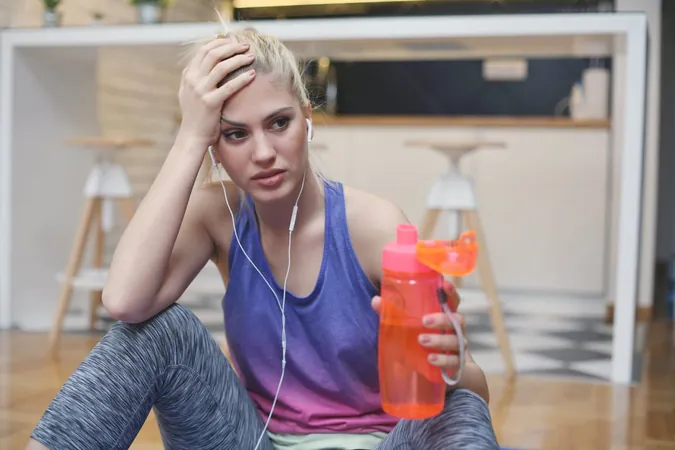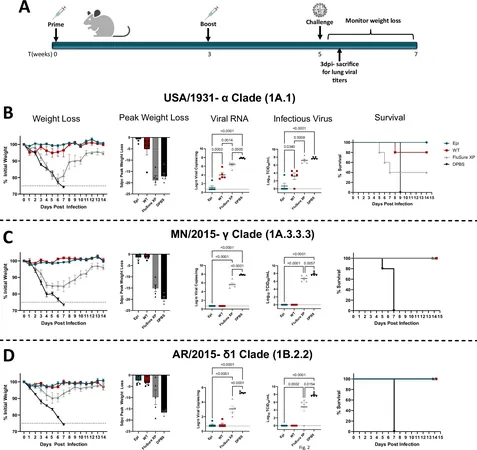
Uncovering the Secret Link Between Intense Workouts and Appetite Control: What Science Reveals
2025-01-26
Author: Mei
Have you ever crushed a grueling HIIT session or endured a challenging spin class only to find your mind blissfully free of thoughts about food? It turns out, there's scientific proof behind this fascinating phenomenon. While more moderate exercises might lead you to fantasize about your favorite foods mid-workout, pushing your limits with high-intensity workouts can surprisingly keep those cravings at bay. Let’s delve into why exerting yourself to the max might just help you resist the urge to raid the pantry.
Researchers at the University of Virginia conducted an insightful study published in the Journal of the Endocrine Society. They investigated how various exercise intensities impact ghrelin levels—the hormone that triggers hunger—and what implications this has on appetite management.
High-Intensity Workouts Hold the Key
The findings revealed that high-intensity workouts significantly decrease appetite compared to moderate exercise or standing still. According to lead researcher Kara Anderson, "Our research suggests that high-intensity exercise may be vital for appetite suppression, making it especially beneficial for those on a weight loss journey."
The Role of Ghrelin: The Hunger Hormone
Within your body, ghrelin manifests in two distinct forms:
- Acylated ghrelin (AG): The notorious "I'm hungry" signal for your brain, constituting about 22% of total ghrelin.
- Deacylated ghrelin (DAG): This form is appetite-neutral, accounting for around 78% of ghrelin and either suppresses appetite or has no effect at all.
Ghrelin plays a vital role beyond hunger control, influencing energy balance, blood sugar regulation, immune response, sleep, and even memory. By understanding how different exercises affect these ghrelin forms, you can better tailor your workouts for effective weight management.
During those intense exercise sessions, your body shifts its energy focus. Instead of fueling digestion, blood flow is redirected to your working muscles, temporarily lessening your interest in food.
The Endorphin Effect: Your Natural Mood Enhancers
Remember that euphoric feeling after a tough workout? That’s the effect of endorphins—your body’s feel-good hormones that not only boost your mood but also help suppress hunger.
Moderate Workouts Tell a Different Tale
On the flip side, gentler workouts like leisurely jogging or yoga don’t have the same appetite-suppressing effects. These exercises are easier on the body, allowing ghrelin levels to remain higher, which can leave you craving snacks even before you finish stretching.
How Long Does the Effect Last?
It’s essential to note that the appetite-suppressing effects of intense workouts are not everlasting. Although you may experience reduced hunger immediately post-exercise, you might feel the stirrings of hunger return a few hours later as your body seeks the fuel it needs to recover. Thankfully, you are likely to crave healthier foods, such as proteins or complex carbohydrates, instead of sugary snacks.
Should You Always Choose Intense Workouts?
The answer isn’t as straightforward as you might think. According to Mehul Jadhav, a fitness nutritionist and trainer based in Dubai, intense workouts are beneficial for short-term hunger control, but they are just one component of a balanced fitness regimen. Moderate exercises offer their own set of advantages, like stress relief and sustained energy, so striking the right balance tailored to your goals is crucial. Remember, don’t skip meals—your body requires proper fuel for recovery and optimal performance.
By grasping how various types of exercise influence your appetite, you can make informed decisions regarding your workout and nutrition strategies, ultimately helping you feel your best and stay aligned with your fitness objectives. So, are you ready to transform your workouts—and your cravings? Dive into that high-intensity session and discover what wonders await!



 Brasil (PT)
Brasil (PT)
 Canada (EN)
Canada (EN)
 Chile (ES)
Chile (ES)
 Česko (CS)
Česko (CS)
 대한민국 (KO)
대한민국 (KO)
 España (ES)
España (ES)
 France (FR)
France (FR)
 Hong Kong (EN)
Hong Kong (EN)
 Italia (IT)
Italia (IT)
 日本 (JA)
日本 (JA)
 Magyarország (HU)
Magyarország (HU)
 Norge (NO)
Norge (NO)
 Polska (PL)
Polska (PL)
 Schweiz (DE)
Schweiz (DE)
 Singapore (EN)
Singapore (EN)
 Sverige (SV)
Sverige (SV)
 Suomi (FI)
Suomi (FI)
 Türkiye (TR)
Türkiye (TR)
 الإمارات العربية المتحدة (AR)
الإمارات العربية المتحدة (AR)